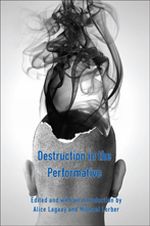 ALICE LAGAAY, MICHAEL
LORBER
ALICE LAGAAY, MICHAEL
LORBERDESTRUCTION IN PERFORMATIVE
Rodopi 2012
Series: Critical Studies
Cultural transformation tends to be described in one of two ways: either with reference to what comes about, is created or emerges in the process of change or with reference to what is destroyed or obscured in that process. Within a performative paradigm, that is, from a perspective which focuses on the manner in which social and cultural reality is constituted or brought about by human activity, theorists have, in recent years, tended to underline the productive aspects of transformation by emphasising the creative thrust of performative processes and events. In so doing, this perspective has tended to overlook the extent to which a certain destructive element may in fact be inherent to such performative processes. Drawing upon a range of historical and contemporary constellations of socio-cultural change and a variety of different types of events and activities, the articles in this volume describe different forms of destruction and their respective role in processes of transformation.
Their shared aim is to explore the manner in which destructivity, such as the destabilisation and destruction of orders, subjects and bodies, can be grasped by concepts of performativity. In other words, to what extent may a certain destructive dynamic be inscribed within this very notion?
Table of Contents
Alice Lagaay and Michael Lorber: Introduction: Destruction in the Performative
Language, Music, Noise
Steffen K. Herrmann: Recognition and Disrespect: Lordship and Bondage in Hegel’s Phenomenology of Spirit
Nikita Dhawan: Hegemonic Listening and Subversive Silences: Ethical-political Imperatives Rebecca Wolf:
Two Saints and the Power of the Auditive Jenny Schrödl: Acoustic Violence in Contemporary German Theatre
Embodiment, Identity, Ecstasy
Barbara Gronau: Asceticism Poses a Threat: The Enactment of Voluntary Hunger
Renate Lorenz: Salomania – Trans and Trans-temporal: A Queer Archaeology of Destructiveness
Volker Woltersdorff: Masochistic Self-shattering between Destructiveness and Productivity
Things, Spaces, Networks Kristiane Hasselmann: Triggering Latency Zones in Modern Society: Richard Serra’s Sculptures within the Urban Setting
Katja Rothe: Creative Destructions: Gabriel Tarde’s Concept of a Passionate Economy
Robert Schmidt: Code Decay: Organizational Performance and Destructivity
List of Contributors